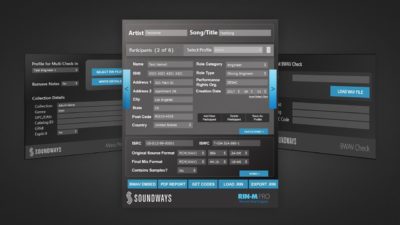Is Soundways Transforming Song Credits Again with RIN-M Pro?
The most revolutionary audio plugin going is as transparent as it gets. You won’t hear it when it’s been dropped onto a project, but its impact will most definitely be felt.
What’s creating all the buzz? It’s RIN-M, an elegantly simple revolution created by the audio solutions provider Soundways. With its ability to vastly streamline the tough task of gathering credits and metadata for credit list approvals and liner notes, RIN-M experienced a hyper-fast fade in to the audio production community upon its introduction this summer.
Now Memphis-based Soundways is kicking credits up another notch. With today’s introduction of RIN-M Pro. For an intro price of $39 (the base version is free), studio pros pick up a number of additional features that make their lives easier, while ensuring that they get credit where credit is due for their hard work engineering, mixing and mastering.
Talk with Soundways CEO Gebre Waddell, and you’ll quickly realize that his company does a lot of things very differently—from research and development to music business models. In this Q&A, we checked in with Waddell about the off-center mindset that led to their intuitive solution, and the next place that credits and metadata will go with RIN-M Pro.
When did Soundways launch RIN-M?
The RIN-M Influencers Release launched July 10th, 2017 as a free download. There will always be a free version, because it should never cost anyone to register song credits.
The RIN-M Pro public beta was launched today, October 6, and includes additional options and key conveniences.
What was the original inspiration behind RIN-M?
Almost every music industry professional has missed credits. Over the years, I’ve seen how it can damage relationships and cost an award, referrals, and even royalty checks.
On the royalty payment side, Performance Rights Organizations spend millions each year manually collecting data for song credits — it’s a big waste.
I’ve had the idea to do this plugin since 2011. The decision to move forward came earlier this year, while planning an event in New Orleans for producers and engineers. We discussed how to update attendees on credits and metadata, but realistically, there was nothing for them to do. That’s when the lightbulb went off — the time was right to develop this plugin.
What is RIN-M? Let us know in a nutshell who it’s for, and what it does.
RIN-M is a plugin that allows users to check-in to sound recordings. From that, it generates metadata and song credit information. After setting up a profile, it takes only a few seconds to do this.
When you finish a recording, and it’s about go downstream to the next person or company, a .RIN file is exported and sent along with the recording. Once received downstream, they may also check-in to the project.
Recording Information Notification (RIN) is a format published by Digital Data Exchange (DDEX), a consortium of companies including Apple, Amazon, Pandora, Spotify and over 30 others. RIN-M represents the most streamlined way to collect a full data set into this format, and with it you’re also seeing the first use of the format.
Once you had the idea for RIN-M, what guided the plugin’s design? What features did it need to have in order to be a truly useful solution to the problem of managing music production credits?
We started by considering a minimum data set, together with the DDEX RIN format.
Next, our internal design and development methods were used. One of which we call Special Purpose Application Design Thinking. We introduced this method to the industry at the Audio Developers Conference last year at the University of London, and also at the Audio Engineering Society (AES) convention. This approach was applied during the design phase.
For example, the .RIN file extension used by RIN-M came from this process, and may be adopted into the standard by DDEX.
The final process was UX auditing, which was used to get the actions down to the least number of clicks and keystrokes.
The result: a system of entering credits and metadata for sound engineers that requires the least amount of time, and in seconds can produce hundreds of lines of metadata.
The response to RIN-M has been overwhelming. What are the metrics that show you that RIN-M is resonating with audio professionals? Why has it proven to be such a viral hit?
I think it’s been such a hit for a couple of reasons. It’s the most painful and long-standing issue in our industry, with a tremendous amount of dialog.
Big organizations move slow and steady, pushing the dialog forward, but are not in the position to produce a cross-platform system for users. Also, they can have limitations for sponsoring efforts. This condition has built up massive, pent-up demand.
We built a release valve, and the results are unprecedented.
The day of release, it was the most shared social media post about software, or hardware, in Pro Tools Expert’s history — even for Pro Tools itself. That was the epicenter of the viral sharing.
Within 14 days, we had users in over 50 countries. In just three weeks, we had coverage, or slated coverage, in virtually every industry publication including here with SonicScoop, a Pensado’s Place episode, Mix Magazine, Tape Op, and many others.
Companies keep their numbers private, however we are fairly certain this is the fastest global adoption of a plugin in the industry’s history.
Despite the successful launch, potential users have a lot of the same questions about RIN-M. What are the most common misperceptions or points of confusion that you encounter?
The most common misperception is that RIN-M embeds the credits into an audio file, or that it uses a watermark. While the RIN-M Pro version embeds ISRCs with artist and song name into wave files, it does not embed the full metadata set. When it comes to the full metadata set with participant credits, we determined the best option was to generate a separate .RIN file to send along with the recording.
Some people believe this should be done with blockchain technology. On that subject, I have developed blockchain technologies in the past. However, after much consideration, we determined the very best approach was not to use blockchain technology during this phase.
You’re about to launch a Pro version of RIN-M. What does it cost, and how does it differ from the free version?
RIN-M Pro is a one-time fee of $49. We’re offering an introductory discount to $39, to support innovators and early adopters.
There are a range of additional features including PDF reports, standalone desktop versions, BWAV embedding and checking-in to multiple RINs in a single action.
You stressed to me that Soundways is not building a business around RIN-M. Why is that important?
The free element needs to be there, and barriers, including price, must be so low that everyone can have access. Considering realistic market size, this isn’t a recipe for sustained growth.
For us, this is one of many products in our pipeline, and we believe RIN-M users will consider becoming continued Soundways customers, for years to come.
What were the founding principles of Soundways? What are the aspects of your offerings, and how you go about developing them, that makes you different?
We’re in Memphis, a historic music city. We crafted our motto, Serve the Music, as a way of channeling our slice of the energy here. It’s the same energy that inspired blues, rock, and soul originators from this area.
Right now, we look like a plugin company, however our mission is to revolutionize the full supply chain of sound recordings, from studio to listener.
You told me that you see this time as “a defining moment in metadata.” Why is that the case?
In this moment, we’ve gone from decades of dialog — to swift, decisive action.
Tangible results are here, and an environment for others to shift from dialog to action has resulted. An amazing example is The Blackbird Academy and Kevin Becka, who partnered with us to create an eBook and iBook to bring this to students and educators.
Thanks Gebre! Anything else you’d like to add?
Just one thing, I would like to encourage readers to download RIN-M and influence others to use it.
Each download, share and purchase is like a vote, and major organizations are watching the polls. Without your support, this goes away — today the future of song credits is in your hands.
— David Weiss
Please note: When you buy products through links on this page, we may earn an affiliate commission.








